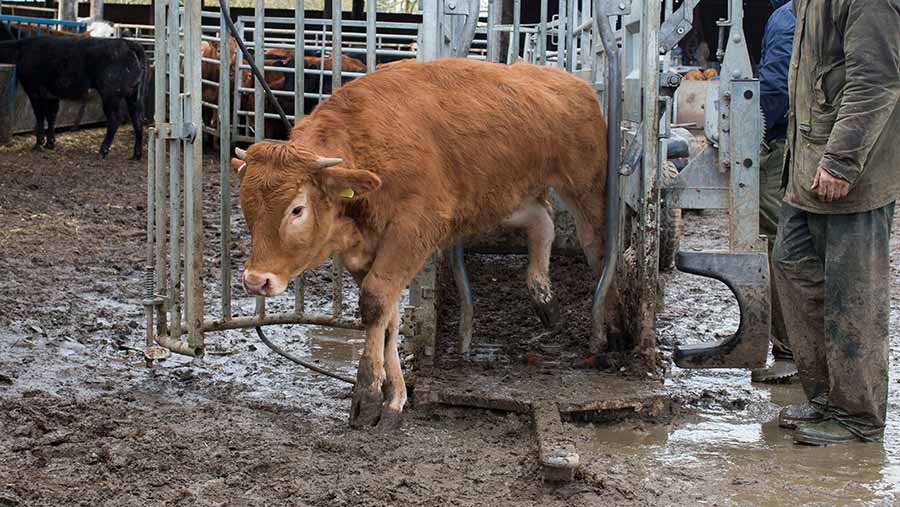Red Tractor plans stricter standards from November 2021
 © David Hartley/Shutterstock
© David Hartley/Shutterstock Raising animal welfare, protecting workers’ rights and enhancing environmental protection are the primary aims of the latest review of Red Tractor standards that farmer members will have to meet from November.
Announcing plans for a fifth major upgrade since the farm assurance scheme was first introduced in 2000, chief executive Jim Moseley said further change was needed to keep up with consumer expectations.
See also: Tacon named new chairman of Red Tractor scheme
“If we don’t evolve and don’t meet consumer demands, they will disregard Red Tractor and probably buy more on price,” he said.
“Similarly, because many retailers, caterers and brands use Red Tractor as part of their buying specification, it is quite possible that without it they would create their own standards, do their own inspections, and would have less reason to support British.”
The consultation, launched on Tuesday 5 January, follows a year of discussions with all parts of the food chain and seeks further “evolution” across the scheme’s six sectors: beef and lamb, poultry, pigs, dairy, fresh produce and combinable crops/sugar beet.
Outcomes
On animal welfare, there will be a greater emphasis on welfare “outcomes” linked to standards, rather than just the “inputs”, Mr Moseley explained.
“This includes housing structure and cleanliness, and will also make clear what is and isn’t acceptable when handling animals,” he said.
A previous consultation has already determined that dairy farmers will have to move away from the routine euthanasia of male calves by the end of this year.
Another priority will be worker welfare, in keeping with Red Tractor’s Farmed With Care strapline .
“It is fair to say that UK agriculture’s health and safety record is not great, and farming is identified as an ‘at-risk’ sector for labour exploitation,” said Mr Moseley.
Even though most farms fall below the turnover threshold required for them to meet the terms of the Modern Slavery Act, it is likely that retailers and processors will be looking to farmers to demonstrate due diligence.
Under the proposals, a Red Tractor ethical trade self-assessment questionnaire will have to be completed within the past two years, and checks will be made on worker accommodation.
There will also be tougher health and safety protocols.
Timeline for change
5 January Consultation opens to all stakeholders
5 March Consultation closes
April/May Technical advisory committees and sector boards consider feedback
June/July New standards and recommendations published
1 November New standards apply, inspections begin
Environment
The third key standards change will be in terms of environmental protection, including Defra’s new Farming Rules for Water, which aim to reduce soil erosion and nutrient run-off.
“We have tried to take those requirements and adapt them into something that is meaningful and can be easily assessed on farm.”
This will incorporate things like having a soil management plan, secure fertiliser storage and rules on pesticide handling.
Consumers are also concerned about greenhouse gas emissions, so planned changes to Red Tractor standards should deliver “care for the planet”, to show that agriculture is “on the front foot”.
Uncertainty
Defending the timing of the consultation, which comes at a time of unprecedented uncertainty for farmers and growers, Mr Moseley said consumer demands have changed significantly over the past four years and Red Tractor needs to keep pace.
The Red Tractor’s head of external affairs, Philippa Wiltshire, added that many farmers will already be delivering most of the proposed changes to standards, so they will not incur extra costs.
Some key changes planned for November 2021
Dairy
• Tethering to be banned as a management practice
• Antibiotics use to be uploaded to an industry medicine hub
• Other medicines use subject to annual review
• Welfare outcomes introduced in relation to housing
• Stricter handling requirements
Beef and lamb
• Tethering to be banned as a management practice
• Annual antibiotics use to be collated
• One person to hold certificate of competence in administering medicines
• Joining a bovine viral diarrhoea (BVD) disease eradication programme to be compulsory by 2023
• Stricter handling requirements
Pigs
• Future Pig Health and Welfare Pathway requirements to be included
• Next set of Ruma’s targets for antimicrobial stewardship to be included
• Persistent high users of antibiotics to implement an antibiotics reduction plan
• All persons involved with pigs to undergo online training in handling
• Deadstock collection to be done at the perimeter of the farm
Poultry
• Light intensity to be measured and recorded at bird-eye level once during each crop
• Windows to be installed in all buildings that house ducks
• Only slower-growing breeds to be used for free-range chicken production
